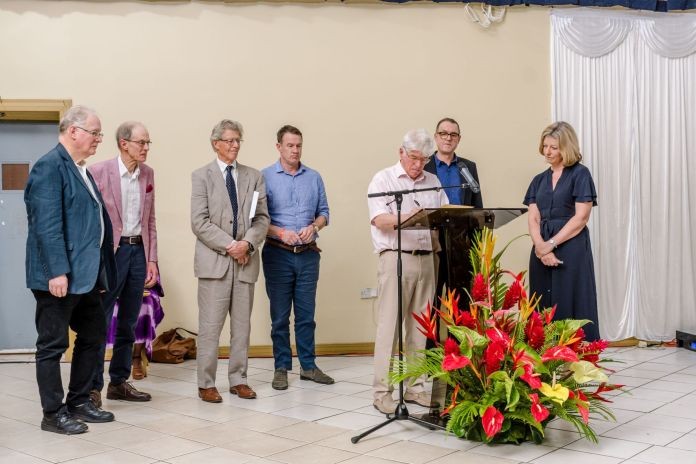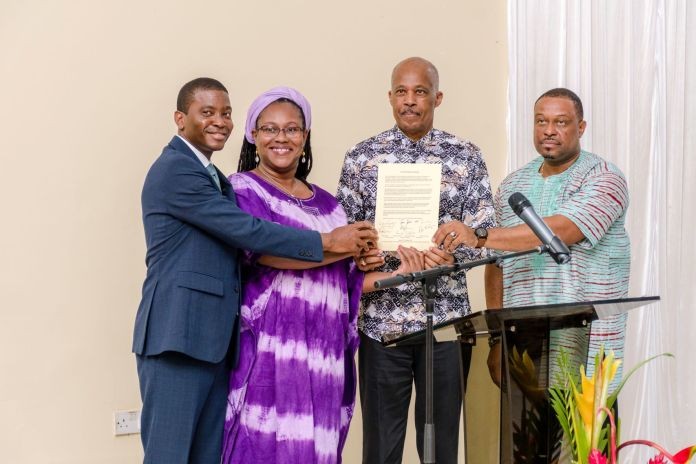By The UWI
KINGSTON, Jamaica – The first point in the Caribbean-led reparatory justice programme jointly championed by The University of the West Indies (The UWI) and CARICOM calls for a ‘formal and sincere apology’ as a precondition of healing for descendants of enslaved peoples.
The Trevelyan Family apology on Monday, February 27, during a forum co-hosted by the Grenada National Reparations Committee (GNRC) and The UWI shows the successful application of this framework, which has come to be known as the “Ten Point Plan”.
Birthed from close consultations with Professor Sir Hilary Beckles in his dual lead roles as vice-chancellor of The UWI and chairman of the Caribbean Reparations Commission (CRC), the Trevelyans delivered a public apology and an initial £100,000 to begin righting the wrongs of their ancestors who owned more than 1,000 slaves in the 19th Century.
Accompanied by a group of seven of her relatives, British-American BBC anchor/correspondent, Laura Trevelyan read an apology, signed by 104 of the descendants of the part owners of six plantations in Grenada. The Trevelyans in their collaborative statement acknowledged slavery as “a crime against humanity,” and noted, “its damaging effect continues to present day.” “We repudiate our ancestors’ involvement in it, and urge the British government to enter into meaningful negotiations with the governments of the Caribbean in order to make appropriate reparations through CARICOM and bodies such as the Grenada National Reparations Committee,” said family spokespersons.

Sir Hilary who brokered and guided conversations with the Trevelyans and the government of Grenada affirmed the transformative significance of the family’s initiative. “These are developments that are transforming the world. These are developments that require courage and commitment to look into your history, your past and to recognize that a crime has been committed. A crime that has led to your own enrichment and privilege and to be able to say this was wrong. It was inhumane.”
“The reparations movement is a call for partnership,” Sir Hilary asserted: “It’s a call for diminishing the debt owed to the people of this region. And it’s a call to have a shared vision for the future.” He clarified. “We’re not calling for racial strife. We’re not calling for international conflict. We believe reparations is the key for a win-win strategy for both sides of this conversation.”
As an activist institution, The UWI continues its championing of reparatory justice and the advocacy, consciousness-raising and support for the CARICOM Reparations Commission’s Ten Point Plan. The Trevelyans credited the Ten Point Plan as “the road map” guiding the Family’s journey to this juncture. Sir Hilary reinforced that the framework calls for “an apology, where there is an acknowledgement of a crime and a genuine and sincere desire to participate in an act of repair.”
Laura Trevelyan’s personal contribution of £100,000 will be used to establish an education fund for The UWI Open Campus, with details of the fund to be determined by the GNRC in collaboration with The UWI and the government of Grenada. Other Trevelyan family members have also made commitments towards bursaries for The UWI Open Campus, Grenada, the Grenada Education and Development Programme, while others have offered their time to ongoing projects in Grenada.
With members of his cabinet in full attendance, prime minister Dickon Mitchell Mitchell accepted the Trevelyan apology on behalf of all CARICOM citizens as the beginning of a step in the right direction.
“As a head of government,” he said, “I want to take the opportunity to join in a public request to my fellow head of government of the United Kingdom to accept our kind invitation to commence dialogue in an open, transparent, frank and dignified manner to talk of the need for reparative justice for the citizens of CARICOM.”
The Forum also included Arley Gill, chair of the GNRC, and Dr Nicole Phillip-Dowe, GNRC’s vice-chair and deputy director (Ag.) of The UWI Open Campus Country Sites (OCCS), other government officials and CARICOM Reparations advocates, along with affiliates of the Rastafarian community and primary and secondary school students from across Grenada. It was held at the Annex, Grenada Trade Centre, and streamed live via The UWI’s public information platform UWItv.
The recorded broadcast from February 27 Grenada Reparations Forum can be accessed here.






